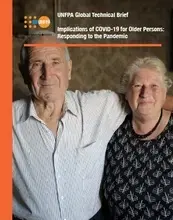International Day of Older Persons -
Older people regularly visiting healthy ageing centres live healthier, longer lives, new study finds
Sarajevo, 1 October 2020 – On the occasion of 1 October, the International Day of Older Persons, the United Nations Population Fund (UNFPA) would like to remind governments and the general public of the opportunities and challenges of population ageing in the 21st century and to promote the development of a society that is welcoming for all ages. The proportion of older persons in Bosnia and Herzegovina has increased from 5% in 1971 to 14.2% in 2013. Population projections show that the proportion of older persons in BiH will continue to grow, reaching approximately 37% by 2050 due to low fertility and the emigration of young skilled persons.
With the increase in the proportion of older persons in society and their vulnerabilities, especially related to COVID-19, the costs of their health care and social protection will also increase. This highlights the importance of preventive measures for healthy aging more than ever.
“Healthy Ageing Centres (HACs), the first of which was opened by the NGO Partnership for Public Health (PPH) in Sarajevo in 2011, are a perfect example of how older persons can be supported to help themselves, but also contribute to society at large. While operating at a very low cost, lower than the cost of medications used for the health care of older persons, their contribution to human longevity and strengthening of human capital in the country is enormous. We are proud to see that by today 17 HACs have been opened in BiH and that we continue to witness the opening of new centres every month. We also hope that new HACs will be opened in each municipality, as well as in other countries in the region”, said Mr. John Kennedy Mosoti, UNFPA Representative in BiH.
In order to promote healthy and active ageing, PPH collaborated with UNFPA and University College London (UCL) on implementation of survey to project the health benefits for members of HACs in Bosnia and Herzegovina. “It is clear from our survey that HACs provide opportunities for older persons to participate in activities that are critical for healthy ageing, such as exercise and developing social networks. These activities are associated with 35-45% decrease in mortality over the span of seven years and a delay of nearly two years in the onset of age-related diseases. The centres provide a cost-effective way to improve the health and well-being of older persons and should be considered as a critical part of any programme developed to support healthy ageing” concluded Prof. Tara Keck, lead researcher from UCL, in her report.
UNFPA invites all national and international stakeholders to actively engage in promoting healthy and active ageing, starting at an early age, as a healthy, educated and engaged population in any society will improve societal outcomes. Strengthening human capital in this capacity is critical for reaching Sustainable Development Goals by 2030.



